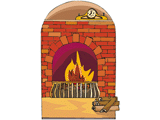What wonderful comments on what is probably the most difficult chapter to discuss.
Jonathan said:
What an astonishing chapter. What it meant to come to America! A quantum leap for Jewish women in role recognition. From Bobbe to Balebosteh. For men, on the other hand, from Patriarch to Accessory.This is one of the themes and I know the questions really don't capture the essence of the material but you are dead right here.
Was the author successful, do you think, in categorizing the men as played out? I wondered when she began saying it was the women who did all the work, because it seemed to me it was the men who were doing all the work, being President, being Treasurer, etc?
So I just wonder if you agree with her that the Power Behind The Throne is and has been the women all along because that IS her premise, isn't it?
But pity the poor women at The Center who never got the chance to be the grandmother who was so endearing. Like Sofie Mann.Or those with no children at all. If, as one's life seems to be shortening, and one looks back, which i think is natural, and asks oneself what really "counted" in their life, what would one say?
Here's what Myerhoff found in the Center people: ------ "What did "count" for these people in reviewing their accomplishments?" (page 266) The partial answer: "Above all, the rearing of children who were well-educated, well married, good citizens, good parents in their own right, children who considered themselves Jews and raised their children as Jews, and who respected their elderly parents...."
Is this, do you think, a universal feeling? It's certainly an accomplishment.
Love the soup talk and recipes. I don't make much soup but I made a potato soup once which was out of this world.
This was very interesting Jonathan:
'Philippe Aries, the distinguished French historian...has produced in this major new book a superb meditation on Western Man's changing attitudes to death....(His) remarkable detective work is matched by the richness of his source materials, which embrace churches and graveyards, religious rituals, wills and testaments, love letters, novels, poems, paintings, diaries, town plans, crime and sanitation reports, bureaucratic papers on the positioning of burial grounds in 18th century Paris and complaints of grave-robbing in 19th century Edinburgh. As he unravels the tangled mysteries of our accumulated terrors and beliefs, he exposes the foundation - indeed the pathology - of our cultural and psychological tensions in the face of death, at the moment in our history when another major transformation of attitudes may be beginning.'I think I need to read that book. Another great suggestion, Jonathan. All this talk of death and dying makes me think of cemeteries.
I have somewhat of a long held interest in cemeteries. I actually, as strange as it may sound, did some graduate work on some aspects of them. That sounds odd but it shouldn't, some of the world's cemeteries are living history. There's Highgate in London with the most amazing statuary you'll ever see, and this city of the dead:
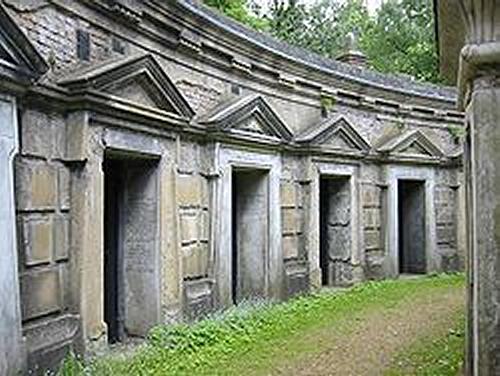
There's Pere Lachaise in Paris, ditto on the incredible sculptures, many in bronze. They are very moving. I can't find my photos so here is Chopin's grave in Pere Lachaise:
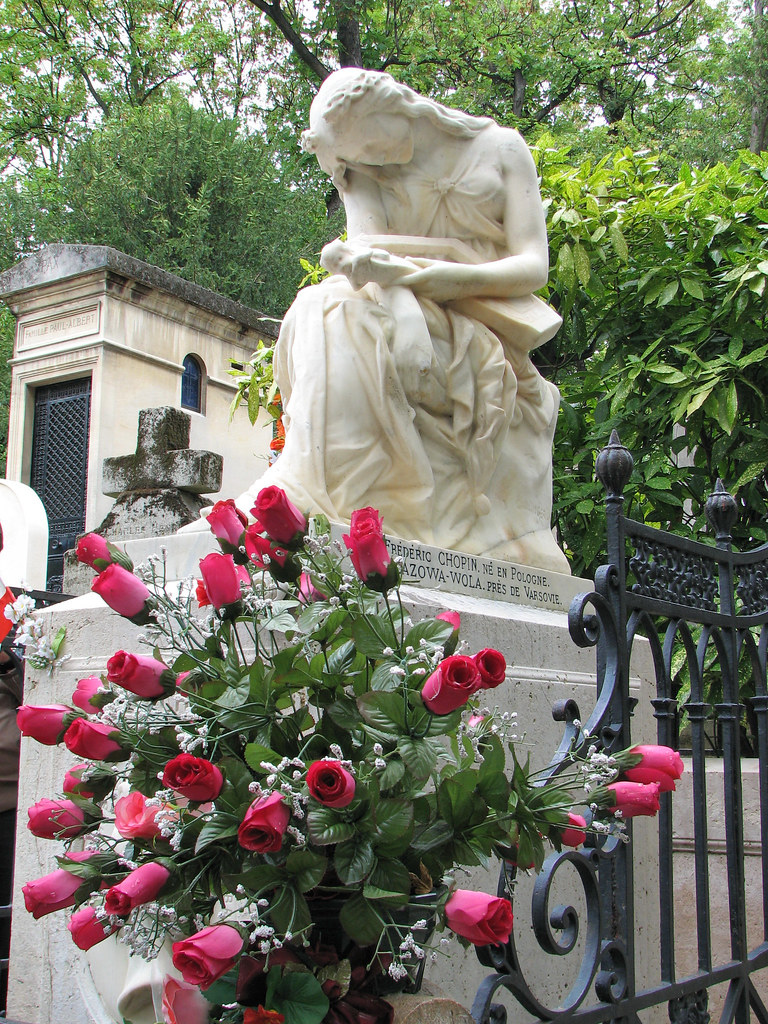
There's the Necropolis at Pompeii:
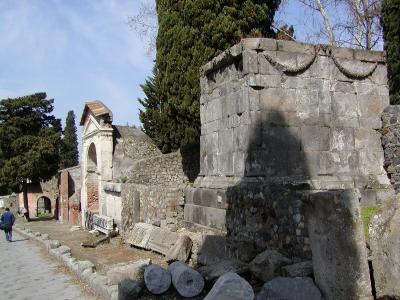
, with its own statuary:
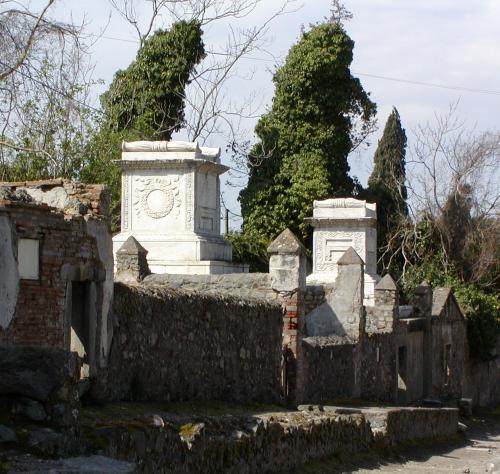
Here you can see a bisellium or seat of honor, you can see the rolls on each end, room for two, but only seating one: the guest of honor. These gentlemen were important enough to receive this honor at public events, but they had been freedmen (free men from slaves) and that's the highest they could attain. Obviously they are proud of it. I think gravestones are fascinating, because they hope to tell the story that our Center folks tell verbally. .
You don't see statuary and mausoleums like these any more.
Such interesting side information and links, Hongfan, and Barbara, on the different philosophies.
We were all posting there together but I went back and reread the posts, thank you for posting this, hongfan:
Ginny, somewhere in your posts I think you raised the old question: if no one is in the forest, whether a falling tree makes a sound? Some years ago, I watched the course "Understanding the Brain" by Professor Jeanette Norden, a biologist and neuroscientist at Vanderbilt University, I really liked her course and excellent teaching (I noticed she has a youtube on Learning and Memory: https://www.youtube.com/watch?v=wtu-yAm4xik, I haven't watched it but thought this might be of interest to you).
During the course, she addressed this question, she said, from neuroscience, the answer is NO. When the tree falls down, it generates the disturbance in the air surrounding it, and that disturbance (or maybe we call it change in air pressure) reaches us human beings, our ears translate the changes into neuronal signals to our brain, and our brain presents it with a sound. In other words, the sound is not generated from the falling tree, but "locally" generated by our brain, it is our brain's interpretation, i.e., our brain's product triggered by an external stimuli. Which means, if there are other organisms with different biological structures, they may not hear sound from a falling tree, maybe they smell something? feel something? we just don't know, but for us human beings, it is a sound. So, if there is no one in the forest, there is no sound when a tree falls down.Thank you for summarizing that, but dogs hear, too, right? And deer? And sound is different from exhalation, one could practice on the family pet. I'd love to really debate this issue, but I love reading all these, to me, very different theories. Isn't there some thought that a dog can recognize his master's voice from others, or is that an old advertisement for a gramophone and not valid? (Too bad I'm not in the Center, I love to pil pul).
And I LOVED the article and tape of your sister's presentation, Barbara! Did you say somewhere she found an Arab influence in Greek philosophy? I thought you did, but I can't find it now. That makes perfect sense to me because the Greeks treated women abominably, particularly Spartan wives. Much rather be a Roman woman than a Greek woman, myself, any day.
My understanding of Greek religion and mythology (not philosophy) is the Greek conception of the gods came from Homer and Hesiod, but they must also have heard stories, themselves, old ones. And who knows from what area? Of course nobody is saying Greek mythology is similar in any way to what we're talking about here.
I think what I was thinking about reading Cicero's De Natura Deorum, is not that he was the first to do philosophy on theology, that never entered my mind, but that it was quite brave of him to compare all the other philosophies in a dialogue, Stoic, Epicurean, etc., against Roman religion. To actually question the nature of gods at all. That took guts, in such a superstitious ritualistic time. And after all it was Cicero who wrote about the "radical possibility of continued existence after death through deification or the immortality of the soul," (that's a quote) and he died in 43 B.C.
